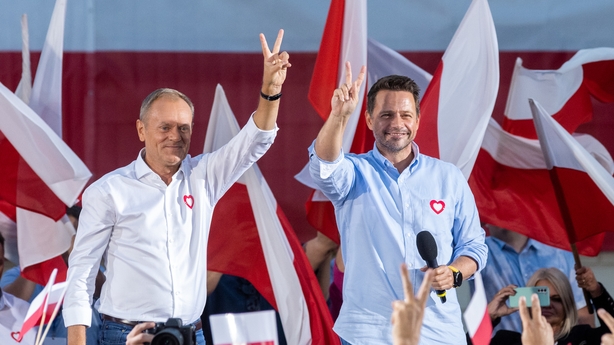Former Polish Prime Minister Donald Tusk and his fellow leaders from Poland's centrist opposition, Civic Coalition, are hoping that one million supporters will turn out in Warsaw today for a mass march two weeks ahead of the country's parliamentary election.
The event, entitled 'The March of a Million Hearts’, is an attempt by the main opposition to show that it enjoys mass public support and to win over undecided voters.
Civic Coalition, which has adopted a red and white heart as the symbol of its campaign, trails the ruling right-wing Law and Justice party by five to eight points, according to various polls.
In an interview this week with Polityka, a Polish political magazine, Mr Tusk said that the elections are a "clash of Poland versus Law and Justice", and that he had invited the leaders of "all democratic parties" to the march.
Wojciech Przybylski, a political analyst, told RTÉ News that the march is a "display of force" by the main opposition "to mobilise their own base and demobilise the opponents".
Mass mobilisation of supporters by both sides, he said, had characterised the election campaign.
Civic Coalition is an alliance of Mr Tusk's own centre-right Civic Platform party, the Greens, smaller liberal parties, and Agrounia, a left-wing farmer’s movement.
Support for the coalition is strongest in big cities and large towns, though the recent addition of Agrounia could mount a challenge for extra seats in rural areas.
The left and the centre-right Third Way, which, when combined account for 20% of voting intentions, have not joined the centrist coalition.
However, one of the leaders of The Left has said that he will attend today’s mass march in the capital.
During eight years in government, Law and Justice has pursued a nationalist, populist agenda, curbing the independence of the judiciary, opposing EU migration quotas and restricting access to abortion.

Mr Tusk, a liberal conservative, has moved himself and his party more to the centre on social issues since returning to Polish politics.
Civic Platform favours civil union for same-sex couples and its election manifesto supports abortion up to the 12th week of pregnancy.
In doing so, Mr Tusk has managed to retain a younger, more liberal faction within Civic Platform and avoid a split in the party.
Mr Tusk returned to Polish politics in 2021 to lead Civic Platform which had been sinking in the polls.
He was the prime minister of two Civic Platform governments from 2007 to 2014, a period when Poland’s economy underwent high growth, and went on to serve two terms as President of the European Council from 2014 to 2019.
During that time, he steered the EU’s tough line on Brexit negotiations and famously said that there was a "special place in Hell" for Brexiteers.
"Tusk has been the embodiment of Polish success in the European Union," said Mr Przybylski, editor-in-chief of Visegrad Insight.
"He is, and was always, building a Polish position that has a deeper engagement in the European Union, which is essentially the message he wants to get through with these elections."
In Mr Tusk's absence from domestic politics, Law and Justice won two successive parliamentary elections in 2015 and 2019, and remains Poland’s most popular party.
Support for the ruling party is polling between 35-38%.
Law and Justice’s campaign adverts on social media have painted Mr Tusk as a liberal who, it claims, supports EU migrant quotas.
In 2015, as President of the European Council, Mr Tusk oversaw a plan to relocate a limited number of migrants from Italy and Greece, but he also warned migrants not to come to Europe the following year.
Law and Justice oppose the EU’s new migrant pact deal and will hold a referendum on the subject on election day on 15 October.
To counter the ruling party's hardline rhetoric on immigration, Mr Tusk has said that the number of visas issued to foreign national increased 50-fold since his party was last in government in 2015.
And, in a video on X in July, Mr Tusk adopted populist language of his own, saying that "Poles must regain control over their country and its borders".
Prior to his time in Brussels, Mr Tusk guarded power closely within his own party and did not promote a successor to replace him.
It was one of the reasons for Civic Platform’s decline after 2014 – the party lacked new blood and its aging leadership failed to connect with younger voters.

Rafal Trzaskowski, the mayor of Warsaw, is Mr Tusk’s most likely successor as leader of Civic Platform.
Mr Trzaskowski, a 50-year-old polyglot who narrowly lost Poland’s presidential election in 2020, has broadened the party’s appeal among younger voters, advocating for LGBT rights and tackling climate change.
Mr Tusk's centrist opposition is unlikely to form an outright majority after election day and may seek to form a broader coalition government.
The most likely ally is the centre-right Third Way, which is polling at 9-10%.
It wants to provide tax breaks to small businesses and is proposing an ambitious spending plan on transitioning to greener energy sources.
However, Third Way is also a coalition and under Poland's electoral rules, coalitions must attain 8% of votes nationally in order to take up their seats in parliament.
Without Third Way's seats in parliament, Mr Tusk would find it difficult to form a government, even a minority one under a confidence and supply arrangement.
Polls show that fewer than 6% of voters remain undecided and Civic Coalition's main competitor for undecided voters is Third Way because they both share similar liberal economic policies.
Third Way is staying away from today's march in Warsaw and continuing its campaign as normal.
"Tusk will need to be extra careful because he will need to form a coalition with those guys," said Mr Przybylski, referring to Third Way.







